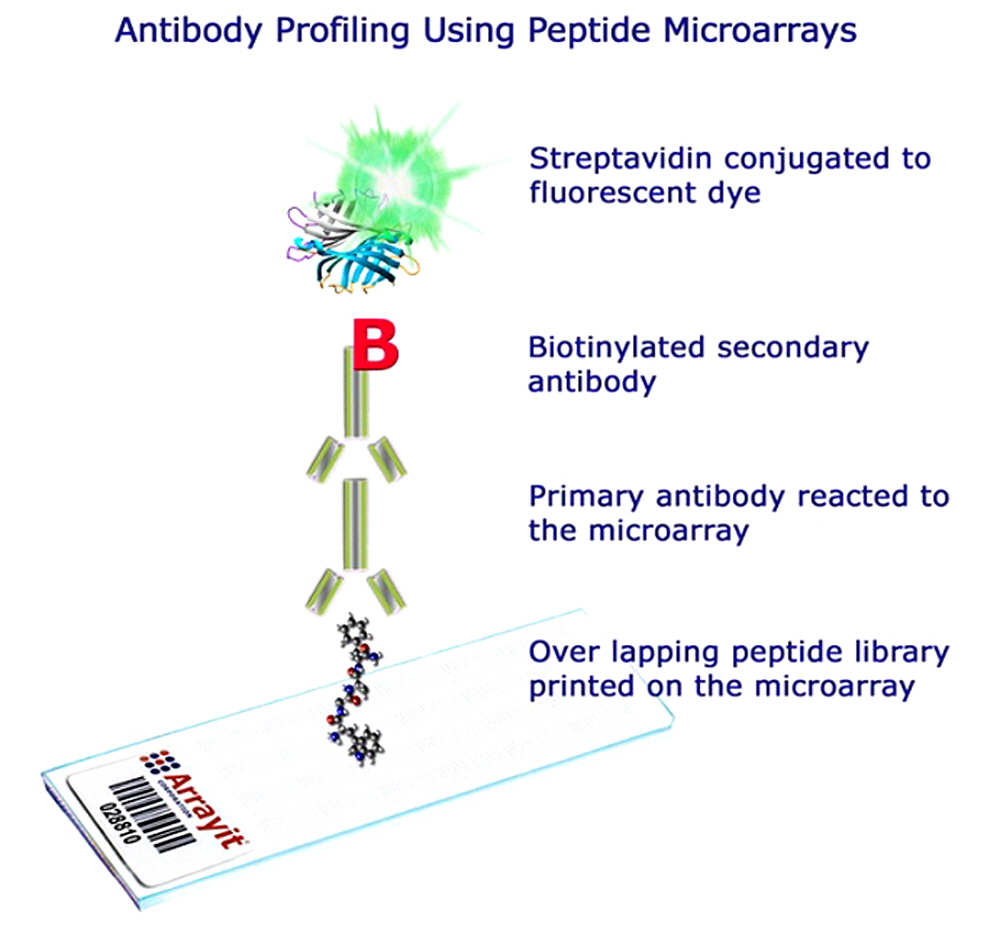Peptide Synthesis and Peptide Microarray Manufacturing for Structural Motif and Linear Epitope Analysis and the Binding of Antigens and Auto-Antibodies
Data Sheet
![]() Shop this product in our online store
Shop this product in our online store
Arrayit Custom Peptides and Peptide Microarray Manufacturing Services provide unprecedented access to high quality peptides and peptide microarrays at affordable prices.

Arrayit Custom Peptides and Peptide Microarray Manufacturing Services provide unprecedented access to high quality peptides and peptide microarrays at affordable prices. Peptides and peptide microarrays are manufactured using the most advanced technology available including state-of-the-art class 100 cleanroom facilities, linear drive robotics, atomically smooth glass substrate slides and superior coupling chemistries. Our peptides and peptide microarrays are widely applicable to research and clinical applications in the life sciences and molecular diagnostics.
Arrayit Peptide Microarray FAQs
Microarrays are compatible with all standard slide based fluorescent microarray scanners, quantification software and processing tools. Microarray are manufacturing using Arrayit’s patented technology, US Patent 6,101,946. Thousands of microarrays can be manufactured with a single peptide library synthesis. Arrayit can provide technical assistance and all tools necessary for processing, scanning and quantifying the microarrays. We can also empower end users to manufacture their own peptide microarrays using the SpotBot and NanoPrint Microarrayers.
Peptides are covalently bound to a glass slide microarray substrate and available for a wide variety of binding assays including:
- biomarker discovery
- antibody profiling
- epitope mapping
- immunoassays
- protein interactions
- kinase screening
- protease screening
- phosphatase screening
- affinity profiling
- protein fingerprinting
Arrayit Peptide Microarrays are stable for up to 1 year at room temperature.
Peptide sequences on scan be as long as 20 amino acids.
Arrayit’s patented microarray manufacturing technology empowers from 10 to tens of thousands of peptides per microarray with extremely low CV’s. Multiple microarrays per slide substrate can also be provided.
Ex-Situ 100% mass spec QC on each peptide before microarrays are manufactured.
Microarray format provides very low reaction volumes, from 10 to 500 micro-liters.
Peptide Microarrays can be manufactured with any number of technical replicates and controls.
Peptide microarrays are compatible with all standard slide based microarray scanners. For best results consider using the Innoscan 710 Microarray Scanner.
Compatible with standard ELISA protocols, formats can be provided to be compatible with ELISA processing automation.

Figure 1. Shows that the FLAG peptides epitopes were recognized by the ANTI-FLAG antibodies, but not by the ANTI-CD28 antibody used as an isotype matched control (negative control). In addition, the scrambled FLAG sequence that was used as another negative control was also not recognized by the ANTI-FLAG antibodies. These results indicate the specificity of the peptide-antibody binding. Figure 1 also shows that peptides containing additional sequences from both PILL and GST demonstrated enhanced reactivity with the ANTI-FLAG antibody. Adding PILL or GST sequences to the peptides did not enhance reactivity to the irrelevant antibody. Data courtesy of Dr. Jonathan Graf and Dr. John Imboden, UCSF. Peptides courtesy of Sigma-Aldrich. Peptides can be up to 20 amino acids in length.

Figure 2. A overlapping series of peptides corresponding to a linear protein sequence can be used to identify the eptitope of a primary monoclonal antibody.

Figure 3. Peptide microarrays can be used to identify antibodies and other binding proteins in human serum.
Arrayit’s peptide microarray capabilities are well documented, e-mail us for a list of publications arrayit@arrayit.com.
Applications for Peptide Microarrays
Identification of protein-protein interaction sites
Identifying protein-protein interaction sites is an extremely valuable tool enabling the design inhibitors, enhancers as well as providing information on binding regions of proteins.
Epitope Mapping
Epitope mapping identifies antibody binding domains. These regions can be used in diagnostics or even implemented in vaccine for drug development.
Drug development
Drug developers want a molecule that specifically interacts with a target protein. Molecules designed to compete with or crowd out other proteins which would otherwise bind to the target, result in either blocking or enhancing protein function.
Diagnostics & Identification of Biomarkers
Peptide microarrays can diagnose disease. Peptides as biomarkers in a miniaturized and multiplexed format test can simultaneously screen for dozens to thousands of biomarkers in a single assay with an eaiser and less expensive protocol than DNA microarrays.

Figure 4. Peptide microarray formats include 1, 2, 4, 8 and 24 individual microarrays per substrate slide (1 x 25 x 76 mm). These formats are compatible with our gaskets and microarray hybridization cassettes.

